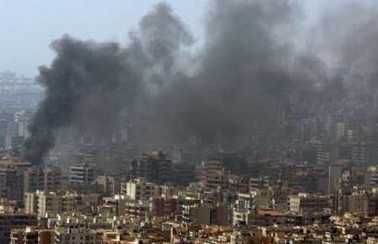
It looks as though Reuters has been discovered sending out Photoshopped versions of pictures in its news reports on the Israeli-Lebanon crisis. They have just released an official apology.
Here is the photo they first published:

And here is the original, unaltered one:

See animated images here and here showing the extent of the image manipulation.
These photographs were taken by a photographer named Adnan Hajj. Here are other photos taken by him, including another one he had modified. Reuters has issued an official statement saying they have dropped Hajj as a photographer. Unfortunately, Hajj took many photos at Qana and these too will now be circumspect as this cartoonist illustrates:

Why is this so bad? Several reasons. First, it shows the lack of quality in Reuters internal review structure, strongly bringing into question the quality of their other reports and photographs. Second, it reduces the confidnce in new information coming from the region and cast doubt on much of the media coverage over there. Thrid, it casts doubt on all of Hajj's former photography and any conclusions based on his pictures. Because of this, it also casts the Arab community in a poor light and adds credibility to claims that events have been staged many times in both Qana and Palestine to create sympathy for the Arab cause. This has the counter-effect of diminishing the believability of legitimate grievences these areas have against Israel. Fourth, this reduced credibility makes it much more difficult to resolve disputes between Arab groups and Israel in a peaceful way.
This discovery at Reuters has launched an in-depth investigation of even more photos coming from the region by the blogosphere. See some of their findings here, here, and here.
Here's one unlucky lady who has lost two homes, two weeks apart, in the attacks!

The tragedy of all of this is that it paints both Reuters (normally an excellent news organization) as unreliable and adds credence to negative impressions of the believability of many Arab sources and organizations. It also bolsters the opinions many in the US have about the unreliabilty of major media organizations, reducing the confidence placed on the accuracy of reporting in this conflict. This will all help prolong the conflict and cost lives on both sides, all of which are incredibly precious. This is the true tragedy of all of this.
P.S. -- Here are the pictures of what really happened:


No comments:
Post a Comment